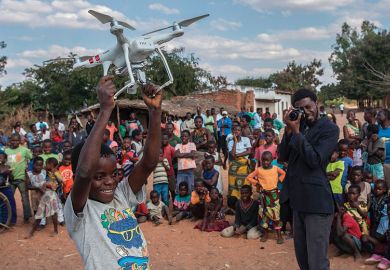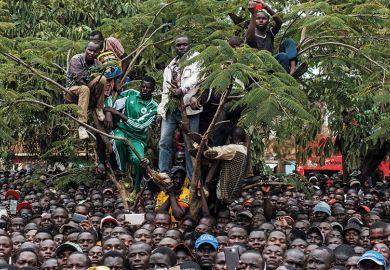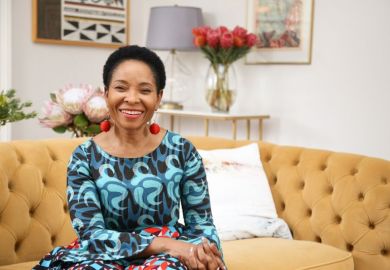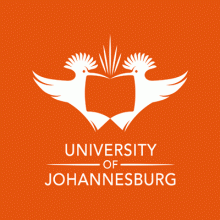Browse the full Impact Rankings 2023 results. To participate in next year’s Impact Rankings, email us
“I always say that being a rector of a university in Africa is much more complex than being the rector of Harvard University,” says Tshilidzi Marwala, who until March this year had spent five years as vice-chancellor of the University of Johannesburg (UJ).
Marwala explains that the responsibility of a university leader in Africa is not confined to the academic project. It also includes dealing with “the social ills in society that emanate from poverty and underdevelopment”.
For Marwala, an artificial intelligence (AI) expert with five patents to his name, technology has been key in uplifting communities from inequality, hunger, political conflict and gender-based violence.
In 2021, during his term as vice-chancellor, he introduced a course on AI and made it mandatory for all 50,000-odd students at the university.
The course content is surprisingly simple compared with what most undergraduates expect, he says. “Many people start thinking about back propagation and multilayer perceptron, and so on and so forth,” he says, referencing AI algorithms.
But he says the course is less complicated. It is meant to ensure literacy around AI and how it can be used in solving real-world problems. “It [the course] just tells you about what this technology is able to do, what it can’t do, and what are some of its pitfalls,” he says.
The university website describes the course as one that helps learners reflect on their role in a world that is “being transformed by AI-driven technology”.
Marwala believes it is essential that students are exposed to the potential of AI before they graduate. “We believe that the understanding of this technology [AI] will aid decision-makers and practitioners alike to be able to use it as a tool to solve some of the complex problems that confront them, including problems of sustainable development,” he says.
He argues that working with technology responsibly can help prevent the perpetuation of inequality – a problem he believes must not “migrate into the digital world”.
In another ongoing project at UJ, researchers are working towards removing bias in algorithms so that they do not discriminate against facial expressions of people from the African continent, since AI is less accurate in recognising people of colour.
The university has also developed an app that helps address issues relating to violent crime. It uses GPS tracking to alert family and friends and quickly contact emergency services if required.
Called Namola, the app is used across South Africa, a country that has suffered from increasingly high levels of gender violence in recent years. According to police records, 52,694 sexual offences were reported between 2021 and 2022. This figure, equivalent to 144 sexual offences a day, is also 14 per cent higher than the year before.
In 2020, the data from Namola showed that 10 per cent of all crime reported to the app was related to domestic violence. The app’s functionality has been extended so it can be used after car accidents and for medical emergencies.
Marwala concedes that the tool is a simple one but says it has the potential to make a “huge” impact in areas such as gender-based violence.
Since Marwala took office, UJ’s offerings in AI have expanded, and the technology is now taught in courses ranging from international relations to brain morphology.
New institutes were set up between 2015 and 2016 with the aim of integrating AI into courses. Among these is the Institute for the Future of Knowledge, which outlines its goal as providing ways to “leverage” the new technologies to realise SDG goals. Research at the institute includes specialisations in diplomacy, focusing on SDG 16: the promotion of just, peaceful and inclusive societies.
Many of these initiatives originated with Marwala’s own research. As early as 2007, his work looked at producing computational models that could predict militarised interstate violence, which resulted in the 2011 book, Militarized Conflict Modeling Using Computational Intelligence.
“Although computational models are not a panacea or always appropriate,” the book says, “we believe that they provide a useful methodology that has not been successfully exploited in the context of interstate conflict analysis, let alone in political science.”
Decades on, with AI now being used in warfare itself, Marwala believes that such interdisciplinary studies – which are still developing in academia – can make significant contributions towards peacebuilding.
“The creation of more peace is not going to just involve people sitting around the table and speaking; it will also involve using technology to be able to better understand conflicts and recommend us systems to guide us,” he says.
More collaborations with universities in Africa are needed, Marwala insists. “I think we need to bring more foreign academics into our universities…and we need to take our academics to the rest of the world, so that we carry the information and the practices that are for the common good.”
While UJ has been active in the international conversation – thanks in part to its higher education networks – he says that is not the case for most universities across Africa. “Problems are common, and you have a very important part of the world that is not part of the conversation,” he says.
Marwala warns against viewing African participation in global research projects as “charity”; the benefits are clearly mutual, he believes. Without including African universities in the solutions to problems such as poverty, Western institutions are bound to embark on “a compromised project”, he says.
He mentions the work of the Massachusetts Institute of Technology (MIT), which runs a lab in Kigali, Rwanda, to monitor environmental pollution, as an example to be followed. More projects like this, he believes, will determine the future of Africa’s academia – and the continent’s ability to tackle pressing societal issues well into the 21st century. The private sector and funding agencies will need to back these efforts, too, he adds.
As for his own motivation and abilities as a leader, Marwala recognises that it was the global nature of his education that has empowered many of his own networks and relationships that criss-cross the world. A mechanical engineer who was trained in the US, Marwala solidified his work in AI during his PhD at the University of Cambridge. He then did postdoctoral work at Imperial College London, going on to supervise PhD students before working as an academic in South Africa for the next two decades.
As he starts the next chapter of this varied career, as the new rector of the United Nations University, which is based in Tokyo and operates across a dozen countries, Marwala reflects on how his time as an AI researcher and university leader in very different environments has influenced his outlook.
While colleagues from his early days at MIT or Imperial who stayed put have operated in an incredibly “data rich” world, he says that by basing his work in Africa, he has been able to pursue AI research that is grounded in its context, working with “imperfect or missing data”.
He was also an early adopter of the UN’s SDG framework because he was able to see first-hand how it aligned with the issues that needed to be addressed, whether as a researcher or an academic leader.
That context, ultimately, has ensured that his career has aligned with what he sees as a founding principle for any academic: “I always believed that education must be beneficial to society,” he says. As the world enters a new era in which AI is predicted to change so much, that same principle must surely apply.
Register to continue
Why register?
- Registration is free and only takes a moment
- Once registered, you can read 3 articles a month
- Sign up for our newsletter
Subscribe
Or subscribe for unlimited access to:
- Unlimited access to news, views, insights & reviews
- Digital editions
- Digital access to THE’s university and college rankings analysis
Already registered or a current subscriber?










